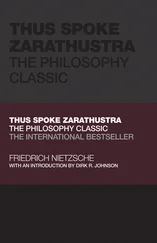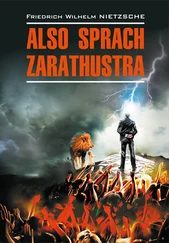Chapter XL. Great Events.
Here we seem to have a puzzle. Zarathustra himself, while relating his experience with the fire–dog to his disciples, fails to get them interested in his narrative, and we also may be only too ready to turn over these pages under the impression that they are little more than a mere phantasy or poetical flight. Zarathustra's interview with the fire–dog is, however, of great importance. In it we find Nietzsche face to face with the creature he most sincerely loathes—the spirit of revolution, and we obtain fresh hints concerning his hatred of the anarchist and rebel. "'Freedom' ye all roar most eagerly," he says to the fire–dog, "but I have unlearned the belief in 'Great Events' when there is much roaring and smoke about them. Not around the inventors of new noise, but around the inventors of new values, doth the world revolve; INAUDIBLY it revolveth."
Chapter XLI. The Soothsayer.
This refers, of course, to Schopenhauer. Nietzsche, as is well known, was at one time an ardent follower of Schopenhauer. He overcame Pessimism by discovering an object in existence; he saw the possibility of raising society to a higher level and preached the profoundest Optimism in consequence.
Chapter XLII. Redemption.
Zarathustra here addresses cripples. He tells them of other cripples—the GREAT MEN in this world who have one organ or faculty inordinately developed at the cost of their other faculties. This is doubtless a reference to a fact which is too often noticeable in the case of so many of the world's giants in art, science, or religion. In verse 19 we are told what Nietzsche called Redemption—that is to say, the ability to say of all that is past: "Thus would I have it." The in ability to say this, and the resentment which results therefrom, he regards as the source of all our feelings of revenge, and all our desires to punish—punishment meaning to him merely a euphemism for the word revenge, invented in order to still our consciences. He who can be proud of his enemies, who can be grateful to them for the obstacles they have put in his way; he who can regard his worst calamity as but the extra strain on the bow of his life, which is to send the arrow of his longing even further than he could have hoped;—this man knows no revenge, neither does he know despair, he truly has found redemption and can turn on the worst in his life and even in himself, and call it his best (see Notes on Chapter LVII.).
Chapter XLIII. Manly Prudence.
This discourse is very important. In "Beyond Good and Evil" we hear often enough that the select and superior man must wear a mask, and here we find this injunction explained. "And he who would not languish amongst men, must learn to drink out of all glasses: and he who would keep clean amongst men, must know how to wash himself even with dirty water." This, I venture to suggest, requires some explanation. At a time when individuality is supposed to be shown most tellingly by putting boots on one's hands and gloves on one's feet, it is somewhat refreshing to come across a true individualist who feels the chasm between himself and others so deeply, that he must perforce adapt himself to them outwardly, at least, in all respects, so that the inner difference should be overlooked. Nietzsche practically tells us here that it is not he who intentionally wears eccentric clothes or does eccentric things who is truly the individualist. The profound man, who is by nature differentiated from his fellows, feels this difference too keenly to call attention to it by any outward show. He is shamefast and bashful with those who surround him and wishes not to be discovered by them, just as one instinctively avoids all lavish display of comfort or wealth in the presence of a poor friend.
Chapter XLIV. The Stillest Hour.
This seems to me to give an account of the great struggle which must have taken place in Nietzsche's soul before he finally resolved to make known the more esoteric portions of his teaching. Our deepest feelings crave silence. There is a certain self–respect in the serious man which makes him hold his profoundest feelings sacred. Before they are uttered they are full of the modesty of a virgin, and often the oldest sage will blush like a girl when this virginity is violated by an indiscretion which forces him to reveal his deepest thoughts.
…
PART III.
This is perhaps the most important of all the four parts. If it contained only "The Vision and the Enigma" and "The Old and New Tables" I should still be of this opinion; for in the former of these discourses we meet with what Nietzsche regarded as the crowning doctrine of his philosophy and in "The Old and New Tables" we have a valuable epitome of practically all his leading principles.
Chapter XLVI. The Vision and the Enigma.
"The Vision and the Enigma" is perhaps an example of Nietzsche in his most obscure vein. We must know how persistently he inveighed against the oppressing and depressing influence of man's sense of guilt and consciousness of sin in order fully to grasp the significance of this discourse. Slowly but surely, he thought the values of Christianity and Judaic traditions had done their work in the minds of men. What were once but expedients devised for the discipline of a certain portion of humanity, had now passed into man's blood and had become instincts. This oppressive and paralysing sense of guilt and of sin is what Nietzsche refers to when he speaks of "the spirit of gravity." This creature half–dwarf, half–mole, whom he bears with him a certain distance on his climb and finally defies, and whom he calls his devil and arch–enemy, is nothing more than the heavy millstone "guilty conscience," together with the concept of sin which at present hangs round the neck of men. To rise above it—to soar—is the most difficult of all things to–day. Nietzsche is able to think cheerfully and optimistically of the possibility of life in this world recurring again and again, when he has once cast the dwarf from his shoulders, and he announces his doctrine of the Eternal Recurrence of all things great and small to his arch–enemy and in defiance of him.
That there is much to be said for Nietzsche's hypothesis of the Eternal Recurrence of all things great and small, nobody who has read the literature on the subject will doubt for an instant; but it remains a very daring conjecture notwithstanding and even in its ultimate effect, as a dogma, on the minds of men, I venture to doubt whether Nietzsche ever properly estimated its worth (see Note on Chapter LVII.).
What follows is clear enough. Zarathustra sees a young shepherd struggling on the ground with a snake holding fast to the back of his throat. The sage, assuming that the snake must have crawled into the young man's mouth while he lay sleeping, runs to his help and pulls at the loathsome reptile with all his might, but in vain. At last, in despair, Zarathustra appeals to the young man's will. Knowing full well what a ghastly operation he is recommending, he nevertheless cries, "Bite! Bite! Its head off! Bite!" as the only possible solution of the difficulty. The young shepherd bites, and far away he spits the snake's head, whereupon he rises, "No longer shepherd, no longer man—a transfigured being, a light–surrounded being, that LAUGHED! Never on earth laughed a man as he laughed!"
In this parable the young shepherd is obviously the man of to–day; the snake that chokes him represents the stultifying and paralysing social values that threaten to shatter humanity, and the advice "Bite! Bite!" is but Nietzsche's exasperated cry to mankind to alter their values before it is too late.
Chapter XLVII. Involuntary Bliss.
This, like "The Wanderer", is one of the many introspective passages in the work, and is full of innuendos and hints as to the Nietzschean outlook on life.
Читать дальше











